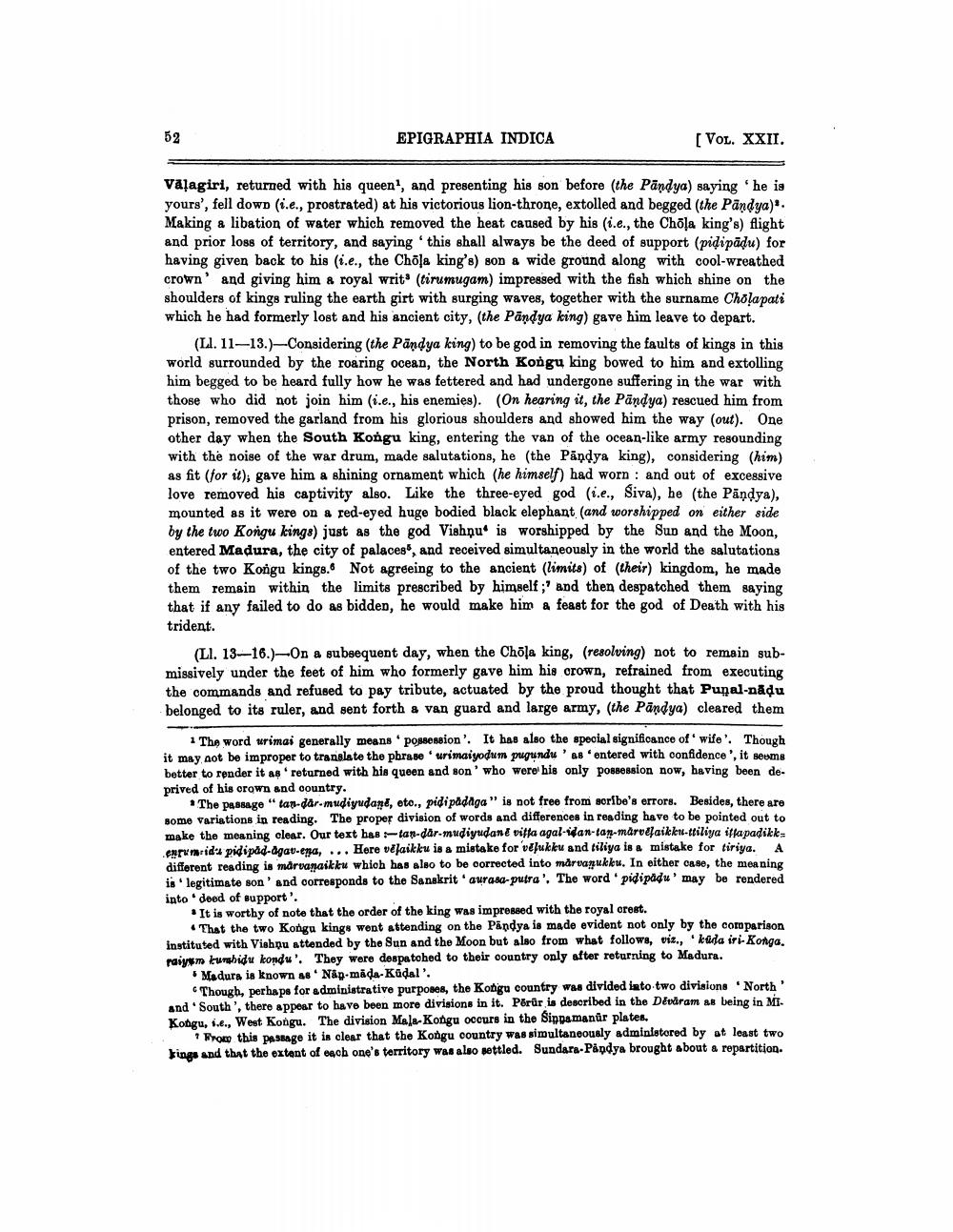________________
52
EPIGRAPHIA INDICA
[VOL. XXII.
Valagiri, returned with his queen', and presenting his son before (the Pandya) saying he is yours', fell down (i.e., prostrated) at his victorious lion-throne, extolled and begged (the Pandya)". Making a libation of water which removed the heat caused by his (i.e., the Chola king's) flight and prior loss of territory, and saying this shall always be the deed of support (pidipādu) for having given back to his (i.e., the Chola king's) son a wide ground along with cool-wreathed crown and giving him & royal writ' (tirumugam) impressed with the fish which shine on the shoulders of kings ruling the earth girt with surging waves, together with the surname Cholapati which he had formerly lost and his ancient city, (the Pandya king) gave him leave to depart.
(11. 11-13.)-Considering (the Pandya king) to be god in removing the faults of kings in this world surrounded by the roaring ocean, the North Kongu king bowed to him and extolling him begged to be heard fully how he was fettered and had undergone suffering in the war with those who did not join him (ie., his enemies). (On hearing it, the Pandya) rescued him from prison, removed the garland from his glorious shoulders and showed him the way (out). One other day when the South Kongu king, entering the van of the ocean-like army resounding with the noise of the war drum, made salutations, he (the Pāņdya king), considering (him) as fit (for it), gave him a shining ornament which (he himself) had worn : and out of excessive love removed his captivity also. Like the three-eyed god (i.e., Siva), he (the Pāņdya), mounted as it were on a red-eyed huge bodied black elephant (and worshipped on either side by the two Kongu kings) just as the god Vishņuis worshipped by the Sun and the Moon, entered Madura, the city of palaces, and received simultaneously in the world the salutations of the two Kongu kings. Not agreeing to the ancient (limits) of (their) kingdom, he made them remain within the limits prescribed by himself ;' and then despatched them saying that if any failed to do as bidden, he would make him a feast for the god of Death with his trident.
(LI. 13-16.)-On a subsequent day, when the Chola king, (resolving) not to remain submissively under the feet of him who formerly gave him his crown, refrained from executing the commands and refused to pay tribute, actuated by the proud thought that Punal-nadu belonged to its ruler, and sent forth a van guard and large army, (the Pandya) cleared them
1 The word urimai generally means ' possession'. It has also the special significance of' wife'. Though it may not be improper to translate the phraseurimaiyodum pugundu's entered with confidence', it seems better to render it as returned with his queen and son' who were his only possession now, having been deprived of his crown and country.
The passage "tan-dar-mudiyudand, oto., pidi pädaga" is not free from acríbe's errors. Besides, there are Bome variations in reading. The proper division of words and differences in reading have to be pointed out to make the meaning clear. Our text ba -tan-dar-mudiyudant vitla agal-dan-tap-marvelaikken-ttiliya itlapadikk. ENT marid: pidipad-agat-ena, ... Here vilaikku is a mistake for vefukku and filiya is a mistake for tiriya. A different reading is märuanaikku which has also to be corrected into maruagukku. In either 0480, the meaning is legitimate son' and corresponds to the Sanskrit aurasa-putra'. The word pidipadu' may be rendered into deed of support'.
It is worthy of note that the order of the king was impressed with the royal crest.
• That the two Kongu kings wont attending on the Pandya is made evident not only by the comparison instituted with Vishnu attended by the Sun and the Moon but also from what followe, viz., kada iri-Konga raiyum kurhidu kondu'. They were despatched to their country only after returning to Madura.
Madura is known 48 Náp-mada-Kudal'.
Though, perhaps for administrative purposes, the Kotigu country was divided into two divisions North and South', there appear to have been more divisions in it. Porür is described in the Deviram as being in Ms. Kongu, i.e., West Kongu. The division Mala-Kongu occurs in the Sinpamanür plates
Wroke this passage it is clear that the Kongu country was simultaneously administored by at least two kings and that the extent of each one's territory was also settled. Sundara-Pandya brought about a repartition.




